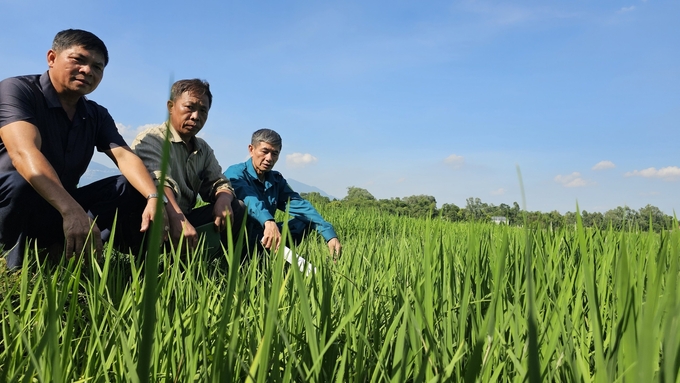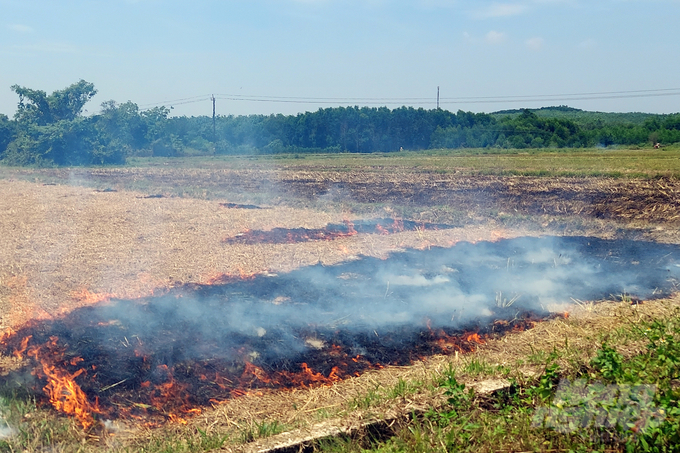May 31, 2025 | 07:37 GMT +7
May 31, 2025 | 07:37 GMT +7
Hotline: 0913.378.918
May 31, 2025 | 07:37 GMT +7
Hotline: 0913.378.918

Representatives of the Farmer’s Union, the Village Secretary, and the Head of Dien Tru village (Huong Dao commune, Tam Duong district, Vinh Phuc) visited the field applying microbial products. Photo: Van Viet.
“In the past, when it was time for weeding, we sometimes even pulled up both the old stubble and new root. Now using microbial products, it only takes 7 to 10 days for the stubble to be completely decomposed. The soil becomes porous, rice gives better yield, farmers lessen the burden of weeding," said Bui Van Khuong (Dien Tru village, Huong Dao commune, Tam Duong district, Vinh Phuc).
For every row of the crop, Khuong mixes 1 kg of microbial products with 20 kg of lime powder to apply. The rice grows strong, up 15 - 20% in yield. That’s the conclusion the 60-year-old farmer comes to after a year of using microbial products supplied by the Vinh Phuc Agricultural Extension Center.
It has been two years since the use of microbial products spread throughout almost every rice field in Tam Duong district. Particularly in Huong Dao commune, approximately 95% of households use the products. “The people of the village have all seen the results. It is a blessing that Vinh Phuc Agricultural Extension Center has provided a supply and offered a 50% subsidy for microbial products,” Khuong said.
Dien Tru village’s secretary and head were the first ones who took the lead, making an example so that local farmers could see whether this method was truly efficient. Nguyen Van Viet, Secretary of Dien Tru village, said that after using the microbial products, the stubble had completely rotted and there was no sign of toxic residues affecting or killing the rice plant.
At the fields in Dien Tru, spreading to both Huong Dao commune and Tam Duong district, the sight of farmers burning straw is almost nowhere to be found. “Big and hard as it is, the stubble is still decomposed into fertilizer. The process is even faster for straws. The important thing is that the soil becomes healthier, farmers do not have to ‘cover the field in smoke’ like before," said Secretary Viet.

Using microbial products helps farmers protect the environment because they no longer have to burn straws after harvest. Photo: Vo Dung.
According to the leader of Vinh Phuc Agricultural Extension Center, using microbial products to treat rice straw in the field for rice production is considered the most effective method to quickly decompose the residual amount of straw, reduce the burning of straw in the fields, make use of the available organic fertilizer from agricultural by-products, improve and protect the soil environment, help rice plants grow and develop without problems, reduce pests and diseases.
Microbial products also contribute to the treatment of organic poisoning that causes the physiological yellowing of rice leaves. Rice farmers in Vinh Phuc now utilize rice straw as an organic fertilizer source and are fully aware of the importance of post-harvest rice straw treatment. This contributes to developing effective and sustainable rice farming and well implementing the province’s agricultural restructuring policy.
According to engineer Tran Duy Lich, Head of Crop Production and Agricultural Extension Department, Vinh Phuc Agricultural Extension Center, every year, Vinh Phuc sows more than 52,000 ha of rice (more than 29,000 ha in the spring crop, 21,000 ha in the seasonal crop), Vinh Tuong and Yen Lac districts plant more than 16,100 ha of rice in particular. As a result, the amount of rice straw after harvest is quite large.
Normally, once the rice is harvested, the straw is left to waste in the field due to low demand for usage, not to mention the short time frame for planting rice in the middle of the spring crop and the seasonal crop (approximately 1 month). So in Vinh Phuc’s districts like Vinh Tuong and Yen Lac, farmers instead burn rice straw in their fields, thus polluting the environment, increasing emissions and causing an imbalance in the field ecosystem.
Making a positive change in the local rice farming scene, the provincial Agricultural Extension Center has promoted the benefits and efficiency of microbial products in treating rice straw after harvest, provided training for technical process and model deployment, supported 50% of the cost of microbial products for the rice crop 2022 used on a total area of 5,000 ha.
Scientific research organizations and production enterprises highly recommend the use of microbial products and beneficial microorganisms to ensure the quality and prestige of crops. Microbiological products rapidly decompose organic substances, enhance useful microorganisms to help prevent pests on rice, quickly decompose the stubble and straw of the previous crop while providing more nutrients for the next rice crop. Applying microbial products to the rice farming model also helps eliminate the phenomenon of root strangulation and physiological yellowing of rice leaves.
Translated by Samuel Pham

(VAN) Several scientists and farmers are experimenting with soil treatment in some key durian-growing regions such as Cai Lay (Tien Giang), Dak Song, Gia Nghia, and Dak R’lap (Dak Nong).
/2025/05/25/4127-3-073637_820.jpg)
(VAN) Thanks to the promotion from an FAO-implemented project, vegetable production in greenhouses in Moc Chau has seen strong development, from 1.5 hectares in 2021 to nearly 50 hectares in 2024.

(VAN) FAO has recently supported USD 140,000 to implement the project 'Risk mitigation human-animal interface risks through disease control initiatives in pig farming.'

(VAN) The People's Committee of Tra Vinh province has approved an adjustment to the investment policy for the Green Hydrogen Plant project, increasing its area to approximately 52.76 hectares.
![Reducing emissions from rice fields: [2] Farmers’ commitment to the soil](https://t.ex-cdn.com/nongnghiepmoitruong.vn/608w/files/news/2025/05/05/dsc08881jpg-nongnghiep-140632.jpg)
(VAN) Clean rice cultivation model in Thuong Tan commune, Bac Tan Uyen district, is assisting local residents in achieving sustainable agriculture by substantially reducing costs, increasing productivity, and protecting the environment.

(VAN) At the conference to disseminate Resolution No. 68, AgriS introduced its digital agricultural ecosystem and reaffirmed its commitment to accompanying the Government in promoting private sector development and sustainable agriculture.

(VAN) 'Blue Ocean - Blue Foods' initiative is designed to restore marine ecosystems and establish sustainable livelihoods for local communities by cultivating a minimum of 1,000 hectares of cottonii seaweed in the first three years.